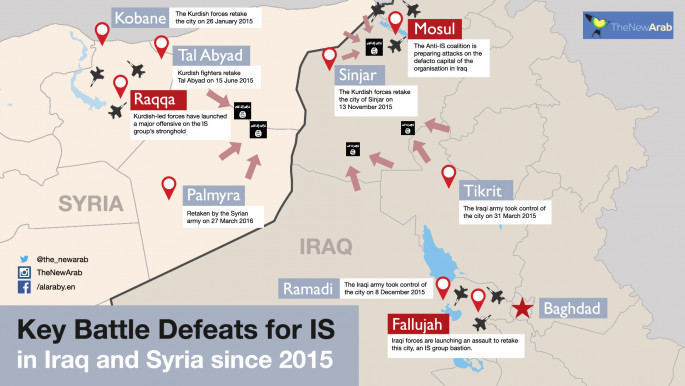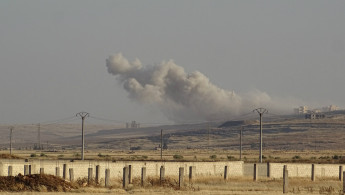Russian jets pound IS-held Tabqa as Syrian forces advance
The forces advanced seven kilometres [less than five miles] towards Tabqa air base, under the group's control in the northern part of the country, the Syrian Observatory for Human Rights said.
"There are fierce clashes now and at least nine pro-government fighters were killed," said the Observatory's Rami Abdel Rahman.
Abdel Rahman had no immediate toll for the number of IS militants killed.
Government fighters have been stuck at about 15 kilometres [10 miles] from the airport for more than one week.
The government assault was accompanied by a heavy aerial campaign on the town, which allowed them to make advances on Sunday.
Fighter jets struck the town of Tabqa with cluster munitions, killing at least 10 civilians, activist group Raqqa is Being Slaughtered Silently said.
Earlier this month, government fighters backed by Moscow began pushing north towards Tabqa, whose dam, military air base, and strategic transit town have been held by IS since 2014.
The town lies some 50 kilometres [31 miles] west of the militant group's de facto Syrian capital of Raqqa, and recapturing it would sever the supply road from the west.
IS fighters had mounted their own counter-attack last week, bringing in reinforcements of fighters and weapons and briefly blocking the regime advance before Sunday's renewed push.
Forces also recaptured the nearby Thawra oil field from IS militants, according to Syrian journalist, Eyad al-Hosain, who is embedded with the army.
The war in Syria, which began with the brutal repression of anti-government demonstrations in 2011, has killed more than 280,000 people and displaced millions.
 |
Agencies contributed to this report





 Follow the Middle East's top stories in English at The New Arab on Google News
Follow the Middle East's top stories in English at The New Arab on Google News
![The UAE is widely suspected of arming the RSF militia [Getty]](/sites/default/files/styles/image_330x185/public/2024-11/GettyImages-472529908.jpg?h=69f2b9d0&itok=Yauw3YTG)
![Netanyahu furiously denounced the ICC [Getty]](/sites/default/files/styles/image_330x185/public/2024-11/GettyImages-2169352575.jpg?h=199d8c1f&itok=-vRiruf5)
![Both Hamas and the Palestinian Authority welcomed the ICC arrest warrants [Getty]](/sites/default/files/styles/image_330x185/public/2024-11/GettyImages-2178351173.jpg?h=199d8c1f&itok=TV858iVg)